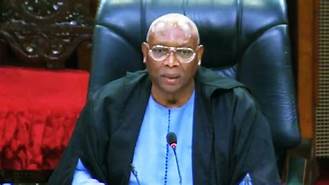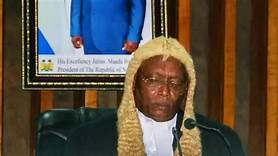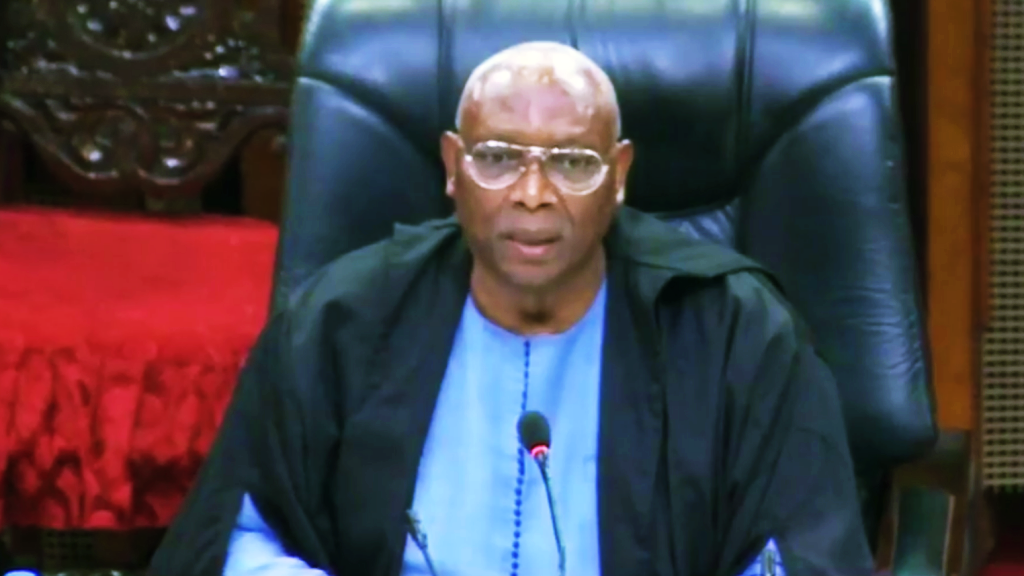Credible reports indicate that Speaker of Sierra Leone Parliament, the Right Honourable Dr. Abass Chernor Bundu, has been elected on Tuesday March 8th 2022 to become the President of the Commonwealth Parliamentary Association (CPA) for the entire African Region. The election of Dr. Bundu happened during the 82nd Executive Committee meeting of the CPA Africa Region that was held in Accra Ghana.
The Sierra Leone Delegation was headed by Hon. Bundu and also included the Leader of the APC Opposition, Hon. Chernor Maju Bah and the President of the Sierra Leone Female Caucus and Commonwealth Woman Parliamentarian, Hon. Veronica Kadie Sesay. Ms. Musu Kalilu, the Desk Officer at CPA Sierra Leone branch also accompanied the delegation.

Published in this edition is the verbatim text of the address delivered that day by Hon. Bundu in his capacity as the newly elected CPA-Africa President. See below to read it.
Statement by Newly Elected President of CPA-Africa, Rt. Hon. Dr. Abass Chernor Bundu
Speaker of Parliament and President of CPA Africa Region, Hon. Dr. Abass Chernor Bundu delivered the following words to the 82nd Executive Committee Meeting of CPA, Africa Region in Accra, Ghana on Tuesday 8th March 2022:
Your Excellency Nana Akufo-Addo, President of the Republic of Ghana,
Rt. Hon. Alban Sumana Bagbin, Speaker of the Parliament of Ghana and Vice-President of CPA International,
Rt. Hon. Justin Muturi, Speaker of the National Assembly of Kenya & Chairperson of the Executive Committee, CPA Africa Region,
Colleagues Speakers of Parliament,
Ministers of Government,
Honourable Members of Parliament,
Distinguished Ladies & Gentlemen
Allow me to start by conveying fraternal greetings from the Parliament, Government and people of Sierra Leone. It’s always refreshing for me to be in Ghana, the land from which so many in Africa have derived such great sense of inspiration and pride over many generations.
Ladies and Gentlemen,
The quest for gender equality is not new in Parliamentary circles. It has been around for the longest time and has continued to gain renewed currency and vigour every season. Today, as we meet in Accra in the shadows of the world’s celebration of another anniversary of the International Women’s Day, we are enjoined as the leaders of Parliaments in Commonwealth Africa to take a pause and carry out some introspection and stocktaking to see what has been achieved in the realm of empowering our women and what still remains to be done. Unless we do this now the glass ceiling over this issue will continue to remain strong and seemingly unbreakable. I made a similar call to the Inter-Parliamentary Union when we met just a few weeks ago at the Headquarters of the United Nations in New York.
In the international arena there is already a plethora of impressive international instruments. They range from the Universal Declaration of Human Rights in 1948 to the Convention on the Elimination of all Forms of Discrimination against Women (CEDAW) adopted in 1979, which is more or less an embodiment of an International Bill of Rights for Women; to the decision of the Commonwealth Ministers responsible for Women’s Affairs in 1996; to the Beijing Declaration; the UN Security Council Resolution 1325; to the establishment of the UN Women and the United Nations Sustainable Development Goals (SDGs). Despite the gradual and incremental nature of the process, all of these international instruments individually and collectively speak eloquently to the empowerment of women, and altogether they prescribe a threshold of 30 per cent in that regard.

Truly and verifiably, there has been some significant progress towards meeting this target in some countries. For example, of the top ten countries in the world with the highest representation of women in Parliament, only three are from the Commonwealth: Rwanda with 56%, South Africa with 44% and Mozambique with 39%. But let us be clear. While these achievements give cause for a modicum of celebration, they do also point conspicuously to the fact that there is still a great deal of work to be done in this respect. Of course, the Executive Branch will tell you they have done their bit by negotiating and signing up to these instruments and our Parliaments, in turn, can reasonably argue that they have stepped up and done the necessary ratification to bring them into the mainstream of domestic legislation.
Yet, Ladies and Gentlemen, what is needed now more than ever is not more and more new conventions but rather the courage to implement the existing conventions we have already signed up to. Some action is urgently required to give impetus to the process of actual implementation. Leadership is required. And, in this regard, I believe the common values we share as African Commonwealth members cast a special obligation upon us to take the lead and show the rest of the world the way forward. This obligation is unique to us not only because of the common values and principles we all share as Commonwealth members but also because of the sheer recognition of the fact that it’s been nearly 43 years since the CEDAW Convention; 27 years since the Beijing Declaration; 26 years since the Commonwealth meeting of Ministers responsible for Women’s Affairs; 21 years since the UN Security Council Resolution; 11 years since the establishment of UN Women; and 7 years since the world set itself a set of targets in the Sustainable Development Goals; and today in 2022 we are still talking instead of making actual implementation the raison d’etre of our actions.
Put simply in practical terms, we should seize the opportunity that the convergence of responsibilities between the Executive Branch and the Legislative Branch gives us by refocusing priority and placing it on actual implementation of existing obligations under these instruments to ensure that we achieve gender equality today as the surest guarantee for a sustainable tomorrow instead of spending more and more resources on adopting new obligations only to add to the existing ones that are yearning for attention.
This gathering here in Accra of the Parliamentary leadership of Commonwealth Africa is therefore of great moment. It affords us the chance to seize the opportunity to take the lead and show the way in advancing this critical agenda forward. We must call for a halt in the adoption of more and more new international obligations as there already exist crucial obligations waiting to be implemented. Ending discrimination against women and dramatically increasing their numbers in Parliament, in the executive branch and in other leadership positions could unleash a more inclusive recovery for all people, not just for ensuring that the particular needs, interests and experiences of women are captured in the decision-making process.
That is not all. There is also the obligation to deliberately and determinedly create the environment necessary to enable women to take their rightful place in the decision-making portals of society. If the future development of our countries is to be sustainable, it is fundamental that the status of women should first be enhanced through education, education and education; education of the men to accept that women are equal partners for development; education of the women to accept that they have a special role to play alongside the men; and education of the children to ensure that their future is assured and sustainable. Most countries, including my own Sierra Leone, are already actively engaged in this process and its progressive annual budgetary allocation is in full resonance with the sacred duty to ensure that there are equal rights and adequate educational opportunities for all citizens at all levels but particularly so for the women and the girl child.
This is a commitment, Ladies and Gentlemen, that must be kept alive and reinvigorated year in year out until gender equality is attained. Putting women and children at the centre of our development agenda will fundamentally drive better and more sustainable development outcomes for all, support a more rapid recovery from the Covid-19 pandemic and place us back on a footing to achieve the Sustainable Development Goals.
This is the new journey we must all embark upon. It may appear to be tough and arduous but undertake we must. And like every journey we must begin with a single step. The goal might look impossible. Even our friends might tell us we can’t do it. We should ignore them. We are not stronger than the people who tell us we can’t do it but the difference is that we must believe in ourselves and in our capacity to change things for the better for ourselves and for our future generations. With these few comments I submit and thank you all for your kind attention.











